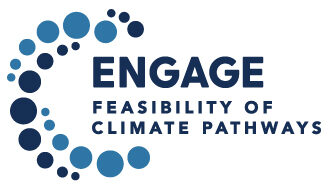ENGAGE Stakeholder Workshop (Beijing)
June 29, 2023
The stakeholder workshop on progress and cutting-edge issues with respect to China’s climate change and co-benefit policy, hosted by the National Center for Climate Change Strategy and International Cooperation (NCSC), was held in Beijing on June 29. The meeting was a face-to-face event with additional broad online participation and was chaired by Chai Qimin, Director of the Strategy and Planning Department of NCSC, and Tian Danyu, Deputy Director.
Opening remarks were made by Xu Huaqing, Director of NCSC; Vicky Pollard, European Commission; Liu Yang, Director of Strategy Division, Department of Climate Change, Ministry of Ecology and Environment (MEE); and, on behalf of the ENGAGE project, Bas van Ruijven.

Xu Huaqing noted that the updated Nationally Determined Contribution plan developed by NCSC was adopted by the Central Committee of the Communist Party of China and The State Council. In this plan, China carbon dioxide emissions should peak before 2030, carbon neutrality should be achieved before 2060 and by 2030 carbon dioxide emissions per unit of GDP will be reduced by more than 65% compared with 2005. The proportion of non-fossil energy in primary energy consumption will reach about 25%, the forest stock will increase by 6 billion cubic meters over 2005, and the total installed capacity of wind power and solar power will reach more than 1.2 billion kilowatts.

After an opening session, the first part of the workshop started with a series of presentations that focused on carbon emission reduction and pollution reduction in China under different policy scenarios. This was followed by short contributions from participants that addressed the following questions: What are the latest developments in China’s policies and actions to address climate change? What are the main synergies between reducing pollution and carbon emission? What are the key policies or key issues that deserve attention in follow-up research?

The second part of the workshop then focused on emission reduction pathways in the industry, energy, construction, and transportation sectors. After five short presentations, participants discussed the medium and long-term emission reduction policies for key industries in China, the impact of the synergistic policies implemented in China to reduce carbon and pollution and the prospects for new power systems and hydrogen energy development.

The workshop participants included policy makers, representatives from business, industry and environmental NGOs, and academia. It provided an excellent opportunity to exchange information on ongoing research on the reduction of greenhouse gas emissions.

